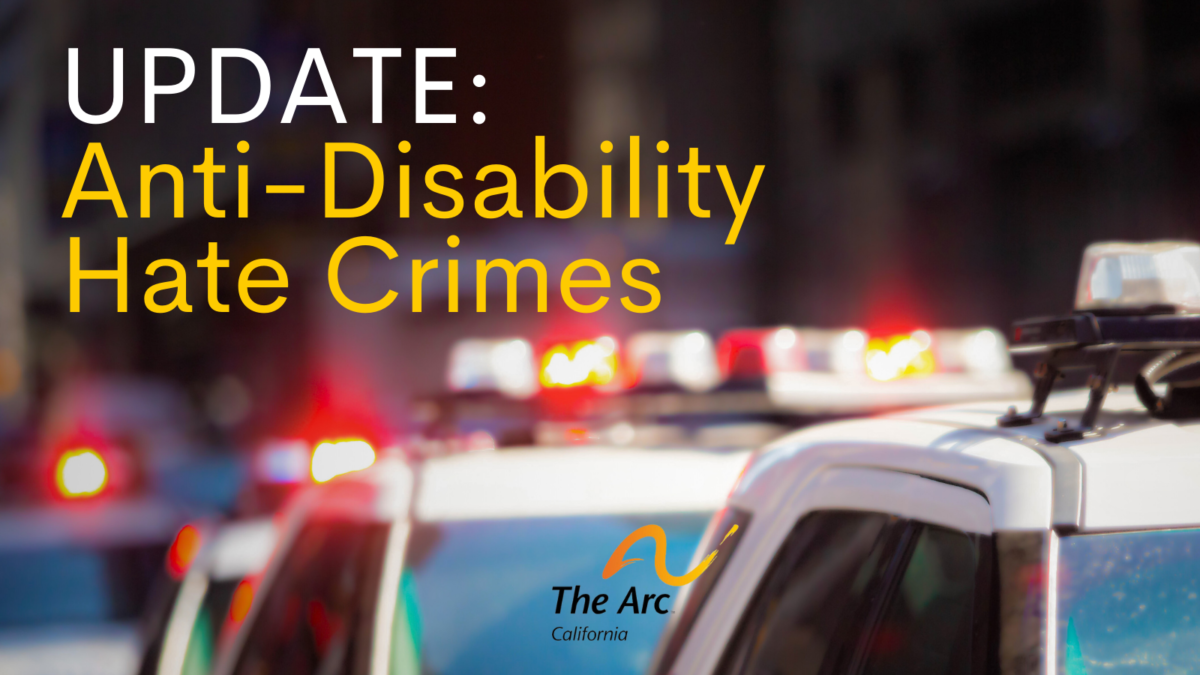By Greg deGiere, Civil Rights Advocate, The Arc of California
As of July 1, every law enforcement agency in California — from the CHP to local park rangers — must have a hate crime policy guiding officers on recognizing and responding to hate crimes. The policy must include extensive information on anti-disability crimes, called “the invisible hate crimes” because they are almost always overlooked as hate crimes.
You can help ensure that your local law enforcement agencies carry out this vital new mandate.
Call the offices of your city police chief, county sheriff, and any other agency that is important to you, such as any local school district, University of California, or California State University police departments. Draw their attention to Penal Code Section 422.86(a)(1), which spells out the requirement. Ask whether the agency has a hate crimes policy as required; most do, but some do not. Also ask whether the agency has a hate crimes coordinator you can talk with about providing more protection to adults and children with disabilities.
The new, universal mandate was the main point of Assembly Bill 449 by Assemblymember Phil Ting, which the legislature passed unanimously and Governor Newsom signed last year. The Arc & UCP California Collaboration led the broad coalition of civil rights and community groups that sponsored and passed the bill after three years of effort.
Why was our 2023 bill needed to protect Californians with disabilities?
Police nationally report less than one-half of one percent (0.4%) of all hate crimes against people with disabilities, according to US Bureau of Justice Statistics and FBI data. Either police don’t recognize an anti-disability hate crime when they see it, or victims and witnesses don’t report it to the police in the first place, so police never have a chance to identify them as hate crimes – or as crimes at all. As a result, the perpetrators are never brought to justice, which does nothing to prevent still more anti-disability crimes.
What is an anti-disability hate crime?
An anti-disability hate crime is any criminal act — from minor vandalism to abuse to sexual assault to murder — committed in whole or in part because of bias (any preconceived negative attitude, not just hate) against the victim’s actual or perceived disability. *Note that a mandated reporter of abuse or neglect of people with disabilities who fails to report may be guilty of a crime, regardless of whether it is a hate crime.
What should you do if you may have been the victim of a hate crime, or you know someone who may have been a victim?
- If it’s happening now or just happened, call 9-1-1. Don’t worry about whether it meets the exact legal definition of “hate crime,” that’s up to the police and prosecutors to decide.
- If it happened in the past, call the city police or county sheriff’s department as soon as you can.
- Report it to the CA vs Hate hotline, (833) 866-4283 (833-8-NO-HATE), 9 a.m. to 6 p.m. Monday through Friday. Or call 2-1-1 to talk to a trained civil rights agent in one of over 200 languages. The hotline also offers help to people who choose not to report to the police.
Why report even if the crime is minor or there’s no known suspect?
The same perpetrator is likely to strike again. Giving police full knowledge of past hate crimes can help prevent and respond to future hate crimes. And getting better data on these crimes can give the public and policymakers a better picture of the problem and what to do about it.
One general part of every law enforcement agency’s hate crime policy must say:
“Depending on the circumstances of each case, bias motivation may include, but is not limited to, hatred, animosity, discriminatory selection of victims, resentment, revulsion, contempt, unreasonable fear, paranoia, callousness, thrill-seeking, desire for social dominance, desire for social bonding with those of one’s “own kind,” or a perception of the vulnerability of the victim due to the victim being perceived as being weak, worthless, or fair game because of a protected characteristic, including, but not limited to, disability or gender.”
Focusing on anti-disability hate crimes, the law says,
“In recognizing suspected disability-bias hate crimes, the policy shall instruct officers to consider whether there is any indication that the perpetrator was motivated by hostility or other bias, occasioned by factors such as, but not limited to, dislike of persons who arouse fear or guilt, a perception that persons with disabilities are inferior and therefore “deserving victims,” a fear of persons whose visible traits are perceived as being disturbing to others, or resentment of those who need, demand, or receive alternative educational, physical, or social accommodations.
What’s next?
Since passage of AB 449 last year, The Arc & UCP has led the civil rights and community groups in asking the state Commission on Peace Officer Standards and Training to upgrade its model hate crime policy, which the law says every agency must adopt. [insert link to attached document]
One major proposed requirement is that every law enforcement agency would name a hate crimes coordinator whose duties include outreach to the community to hear their concerns and encourage reporting.
Stay tuned on these efforts. If you have any questions or can offer support, please email me.

